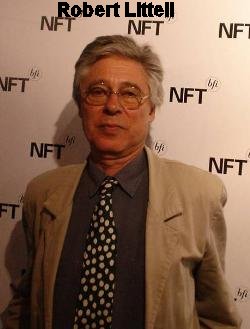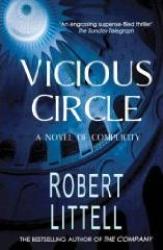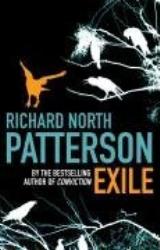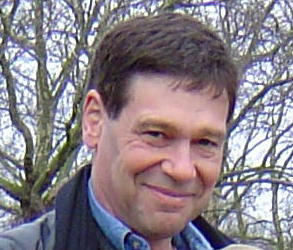NO
PEACE IN SIGHT
Vicious Circle by Robert
Littell Duckworth Overlook £7.99 ISBN 9780715637494
Exile by Richard
North Patterson Pan £6.99 ISBN 9780330440134
 It's unlikely
there's a more intractable geo-political
problem than that of Israel and Palestine. Not only is it a
tragedy of epic proportions
within its own lands, but it is a root motivator of much of the
extremism that
sees itself transformed into terror around the world.
It is a conflict which forces the United States government into
positions that may flow
contrary to its overall best interests, and sometimes contradict much
of its
stated foreign policy goals. It is also such a tinder box issue in America, that it takes a
certain amount of courage
simply to approach it in a balanced way.
It's unlikely
there's a more intractable geo-political
problem than that of Israel and Palestine. Not only is it a
tragedy of epic proportions
within its own lands, but it is a root motivator of much of the
extremism that
sees itself transformed into terror around the world.
It is a conflict which forces the United States government into
positions that may flow
contrary to its overall best interests, and sometimes contradict much
of its
stated foreign policy goals. It is also such a tinder box issue in America, that it takes a
certain amount of courage
simply to approach it in a balanced way.
It is surprising
how
few writers who operate in the espionage genre have delved into the
issue
itself, which is why two recent novels by very different sorts of
novelists
have been so fascinating to compare.
Actually, that one of those two should be Robert Littell
is no surprise
at all. Littell is one of America's very best spy
novelists: one of the first to
be compared to John LeCarre (when he wrote The Defection Of AJ
Lewinter) and
one of the few to be compared to Norman Mailer (with his massive CIA
novel The
Company). If there
is a big three of
American espionage, Littell would have to be there along with Charles
McCarry
and Alan Furst (and Furst, thus far, has dealt exclusively in the past). And Vicious Circle is a
novel firmly grounded
in the world of intelligence, with its focus on the hunt for an
American-born
fundamentalist rabbi and leader of the settlement movement, who is
kidnapped
and held for ransom by a legendary Palestinian assassin.
Richard North
Patterson,
on the other hand, is best-known as a writer of legal thrillers, though
following the course of his career, his best work has usually been done
on the
political side; I once said he's much closer to writers like Allan
Drury
(Advice and Consent) than to, say, John Grisham or Scott Turow, with
whom he's
more usually compared. So
with that
interest in politics, it's not shocking that he chooses the
Arab-Isareli
conflict as the basis for a thriller, but what is fascinating is the
way he
frames his book within the boundaries of the courtroom genre in which
he's
worked. A moderate
Israeli prime
minister is assassinated in San Francisco, and a
Palestinian woman is accused of having
masterminded the killing. For
her
defense, she turns to a prominent local attorney, with whom she had a
secret
affair in law school, and who is, of course, Jewish.
On the face of it,
very different books. Indeed,
Patterson's follows his template, which is that of a lawyer, sometimes
a lawyer
turned politician, engaged in a battle where his loyalties to
individuals will
be set against both his self-interest and usually his overall aim. It
breaks
the mold in that the lawyer in question, David Wolfe, is not one of the
small
circle of characters who recur in Patterson's other novels, and which
is one of
the things that keeps them interesting, even when the people themselves
seem
too good to be true. The
story becomes,
for a long while, Wolfe's own initiation into the intricacies of the
conflict,
forcing him not so much to choose sides as to reconsider the whole
element of
sides themselves. Which
is, in the end,
what Patterson has set out to do. The title of the book reflects the
fact that
both the Jewish people and the Palestinians are exiles, and winds up
taking a
very balanced perspective on the roots of the conflict, or, more
importantly,
the prospects of solution for it.
Patterson's is a very liberal approach, recognising common
ground,
common struggles and common humanity, and what he is at greatest pains
to
reveal is the way that the conflict has become self-perpetuating, with
vested
interests of both sides with no desire to see it stop at anything short
of
total victory.
But the novel
itself
remains a typically Patterson courtroom battle, with the resolution
very much
one of personal betrayal, which is the core of all his novels that do
resolve
themselves in courtrooms, rather than the political process. As is
frequently
the case, the ultimate villain is pretty obvious early on, but the
reader is
given plenty of uncertainties along the way. That he chose not to
pursue this
issue with a series character like President Kerry Kilcannon (and most
of
Patterson's books have featured a cast of recurring, and often
interlocking,
characters) is significant in itself, and a signal of how intractable
he finds
the situation. Thus
when Wolfe goes to Israel, his education
becomes the readers, and there
really isn't too much point to the trip other than that.
Littell's book is
much more grounded in the world of intelligence, and where Wolfe's
attempts to
get to the root of the intelligence are an issue for him and his
client, in
Littell's book the workings of intelligence agencies (and the
Palestinians own
equivalent) are the core of the story.
Its ultimate point, however, is very close to Patterson's,
in that his
extremist rabbi and Palestinian kidnapper are inevitably drawn
together, closer
and closer, to the point where their enmity becomes self-contradictory. At the heart of both books
is a real sense,
an outsiders sense, that these two peoples are indeed more similar than
different, and that a solution is possible. If Littell's ultimate twist
turns
out to be a personal one, and perhaps not totally convincing in terms
of
execution, if not character, it is the solution to which he has been
building
all through the story. Perhaps
because
his books deal with intelligence professionals, rather than lawyers,
Littell
may have more faith in the ultimate good intentions of such men. But
the point
of his book his summarized in his title, and it's every bit as
pessimistic as
Patterson's.
That the crime and
espionage genre should be the place such issues are addressed is
fascinating in
itself. Speaking
about a McCain rally,
where the candidate himself repudiated calls by Mitt Romney and Rudi
Giuliani
for 'more Guantanamos' by asking if America really wanted a 'second
Spanish
Inquisition', Matt Taibbi reflected that it's a strange world where
speaking
against the Inquisition can be seen as an act of political courage. This is more evident for
Patterson, who, as a
lawyer has presented a balanced case. It's more bleak for Littell, who
has laid
out the details on the ground, and sees the most promising future for
the
enforcers, not the peace-makers. These
are two informed and revealing books, and make a finely matched pair.

Published
by Gerald Duckworth & Co Ltd
(26 Jun 2008) pbk £7.99
|

Published
by Pan Books
(2 Nov 2007) pbk £6.99
|
|







